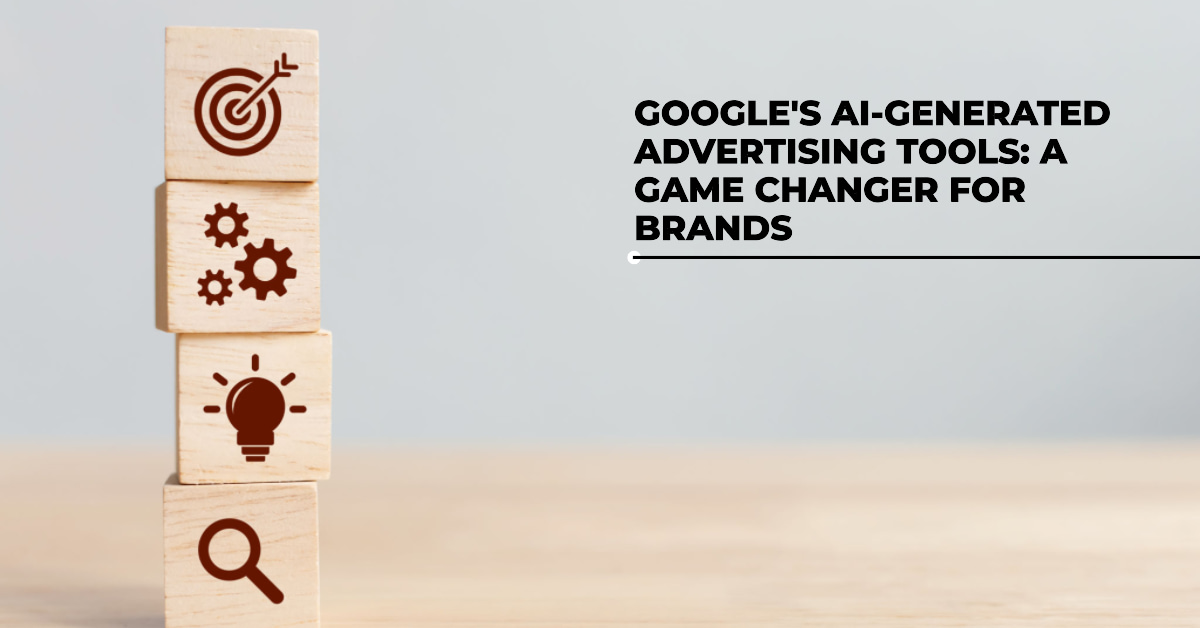Google’s AI-Generated Advertising Tools: A Game Changer for Brands
Google, the tech giant known for its innovative solutions, has recently unveiled a new set of AI tools for advertising, marking a significant shift in the digital marketing landscape. These tools were announced at Google Marketing Live, an annual conference showcasing new ad tech.

Insight: The Evolution of Google's AI-Powered Ad Tools
- Google's AI tools simplify search ads by combining marketers' expertise with Google's AI
- The new AI-generated search experience is fundamentally different from traditional search
- Google's “product studio” uses AI to create ads and touch-up images

One of the most exciting developments is the ability to generate ad copy using text prompts, similar to how one commands ChatGPT to write text. This feature is part of Google's efforts to introduce a more natural-language conversational experience within Google Ads. Marketers can now use chat prompts, a conversational technique, to build ads that run across Google's ad platform.

Google's AI-powered ad creation tools have been updated to simplify search ads by combining marketers' expertise with Google AI. This new approach is designed to jumpstart campaign creation and streamline the overall process.
The tech giant is also experimenting with new ad formats in its AI-generated search experience, potentially revolutionizing how marketers approach search advertising. This new search experience is fundamentally different from traditional search, and it was widely released during the Google I/O developer conference earlier this month.

Action: Embrace the Power of AI in Ad Creation
- Leverage Google's new AI tools to generate ad copy using text prompts
- Utilize chat prompts to build ads that run across Google's ad platform
- Experiment with new ad formats in Google's AI-generated search experience
Insight: The Impact of AI on Traditional Search Ad Campaigns
- AI tools provide a “conversational experience in Google Ads.”
- AI is used not only in ad creation but also in ad targeting and campaign management
- The new AI tools are set to bring about significant changes in the digital ad ecosystem

Google's AI tools are not just limited to ad creation. They are also being used to target ads on many of the ad platforms. For example, Google has released a new “product studio” that uses AI to create ads and touch-up images. This tool is similar to the one built by Meta, where marketers chat with the machine, using text-to-image prompts to alter images.
AI is also used to run traditional search ad campaigns, appearing in Google results outside the generative AI search experience. These new AI tools are described as a “conversational experience in Google Ads,” providing a more interactive and engaging approach to ad creation and management.
Action: Harness AI for Ad Targeting and Campaign Management
- Use AI to target ads on various ad platforms
- Engage with the machine using text-to-image prompts to alter images
- Implement AI in running traditional search ad campaigns
GROW: Embracing the Future of Digital Advertising with AI
Google's new AI tools for advertising could be revolutionizing the digital ad ecosystem. By embracing these tools, marketers are promised to create more personalized and effective ads, enhancing their overall advertising strategy. The key actions to take are to leverage these AI tools in ad creation, experiment with new ad formats, and implement AI in ad targeting and campaign management. The insights gained from these actions will pave the way for more innovative solutions in the world of digital advertising. Embrace the power of AI by learning these new tools and grow your brand in this new era of digital advertising.
Google Generative Search Experience FAQ
What is Google Generative Search Experience (SGE)?
- Google's Search Generative Experience (SGE) is an experimental version of Google's search engine that uses artificial intelligence to generate contextual answers to complex questions. (Page 12)
How does Google Generative Search Experience work?
- The new Google search experience may display an AI-generated answer above the search results listings. Google clearly labels the answer as Generative AI is experimental, which is then followed by an answer to your query. The answer is boxed in. Google cites the websites it used to generate the answer. Those sites can be clicked on to dig deeper. Or you can follow up with an additional question or even click the toggle button at the top right to dive deeper. (Page 0)
What are the implications of Google Generative Search Experience for businesses?
- Google has stated that they will test and evolve the ads experience as they learn more. It's likely that more changes are coming. For now, here are some of the implications of SGE for businesses. All Google says about ad location on SGE results is that “ads will continue to appear in dedicated ad slots throughout the page.” We do get a peek at one commercial query result. On it, ads are located across the top, ahead of the generative AI snapshot. (Page 22)
How will Google Generative Search Experience affect SEM?
- The introduction of Google's Search Generative Experience (SGE) may cause some anxiety among marketers due to potential changes in Google search pages. The impact of AI-generated responses on site clicks and the performance of search ads on SGE pages are still uncertain. However, Google has stated that they are still focused on driving traffic to websites and keeping search ads a “native part of SGE.” (Page 12)
How can businesses adapt to Google Generative Search Experience?
- Google has stated that they will “test and evolve the ads experience as they learn more.” This suggests that businesses should stay informed about updates to SGE and be prepared to adapt their strategies accordingly. Google has also mentioned that ads will continue to appear in dedicated ad slots throughout the page. (Page 22)
What are the benefits of Google Generative Search Experience?
- Google's Search Generative Experience (SGE) uses AI to enhance the search experience in three ways:
- AI snapshot: Generates a unique summary for some longer queries.
- Conversational mode: Answers follow-up questions while retaining the context of the original search.
- Vertical experiences: Provides a preferred list of features and more product details in commercial searches. (Page 13)
What are the challenges of Google Generative Search Experience?
- The introduction of Google's Search Generative Experience (SGE) may cause some uncertainty among marketers due to potential changes in Google search pages. The impact of AI-generated responses on site clicks and the performance of search ads on SGE pages are still uncertain. However, Google has stated that they are still focused on driving traffic to websites and keeping search ads a “native part of SGE.” (Page 12)


